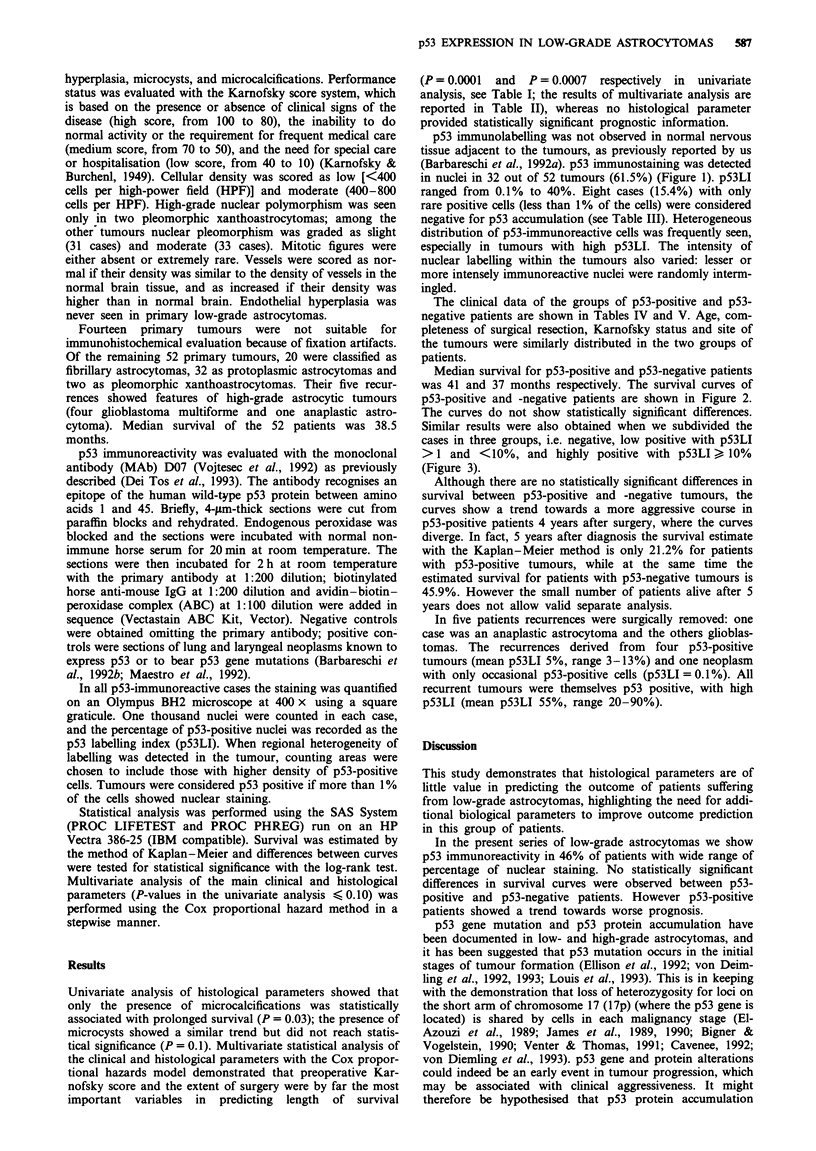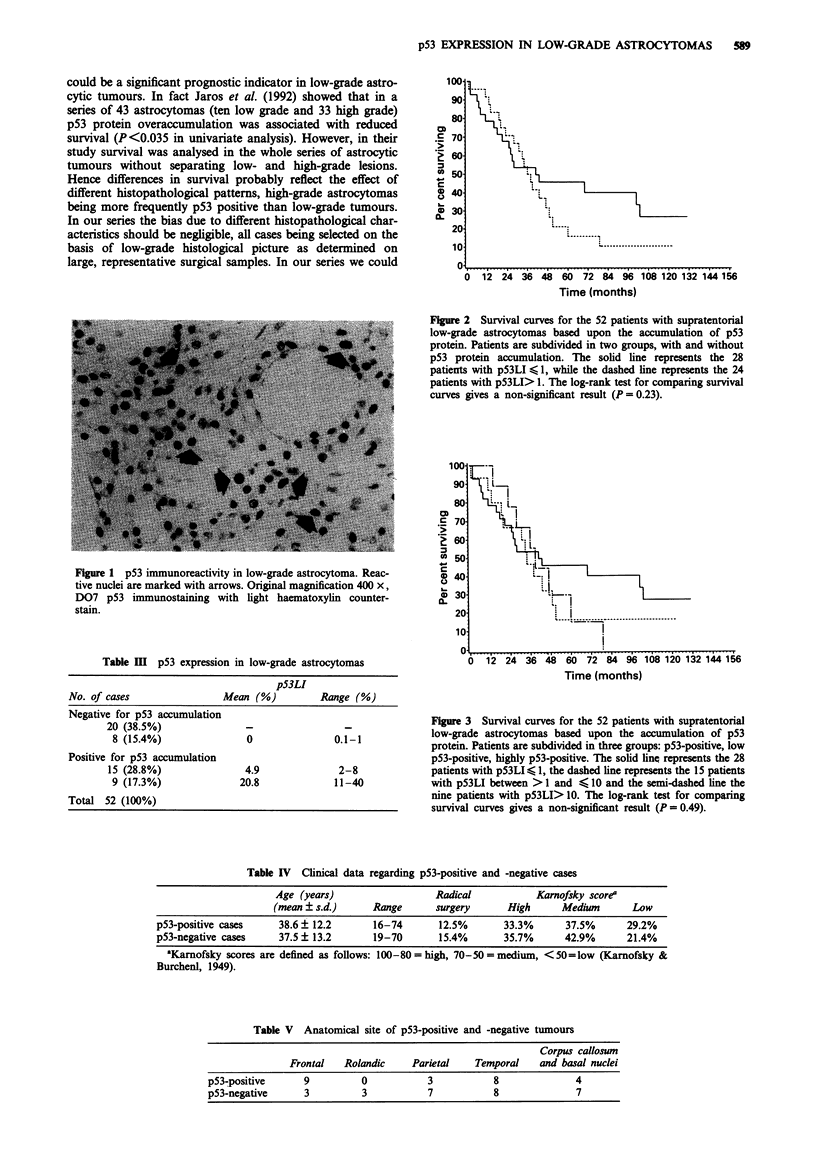Abstract
The immunohistochemical expression of p53 protein (p53) was examined in 52 patients out of a series of 66 patients with low-grade astrocytomas with long-term follow-up. All patients were also evaluated for several clinical and histological features, among which only preoperative Karnofsky score and the extent of surgery were statistically significant parameters to predict outcome on multivariate analysis. p53 accumulation was seen in 46.1% of patients, with a wide range of percentage of positive cells. Median survival for p53-positive and p53-negative patients was 41 and 37 months respectively. The survival curves of p53-positive and -negative patients were not statistically different. However, the curves showed a trend towards a more aggressive course in p53-positive patients beginning 3-4 years after surgery. Five years after diagnosis the survival estimate with the Kaplan-Meier method was 21.2% for patients with p53-positive tumours and 45.9% for patients with p53-negative tumours. This trend is not due to different distribution of major clinical prognostic factors (age, incomplete resection or Karnofsky status). The trend could be related to the time needed by the p53-positive clone to outgrow the rest of the p53-negative neoplastic cell population. This hypothesis is further supported by the fact that the five recurrences which were surgically removed (one anaplastic astrocytoma and four glioblastomas) derived from p53-positive tumours and were themselves intensely p53 positive.
Full text
PDF





Images in this article
Selected References
These references are in PubMed. This may not be the complete list of references from this article.
- Allegranza A., Girlando S., Arrigoni G. L., Veronese S., Mauri F. A., Gambacorta M., Pollo B., Dalla Palma P., Barbareschi M. Proliferating cell nuclear antigen expression in central nervous system neoplasms. Virchows Arch A Pathol Anat Histopathol. 1991;419(5):417–423. doi: 10.1007/BF01605076. [DOI] [PubMed] [Google Scholar]
- Barbareschi M., Girlando S., Mauri F. A., Arrigoni G., Laurino L., Dalla Palma P., Doglioni C. Tumour suppressor gene products, proliferation, and differentiation markers in lung neuroendocrine neoplasms. J Pathol. 1992 Apr;166(4):343–350. doi: 10.1002/path.1711660405. [DOI] [PubMed] [Google Scholar]
- Barbareschi M., Iuzzolino P., Pennella A., Allegranza A., Arrigoni G., Dalla Palma P., Doglioni C. p53 protein expression in central nervous system neoplasms. J Clin Pathol. 1992 Jul;45(7):583–586. doi: 10.1136/jcp.45.7.583. [DOI] [PMC free article] [PubMed] [Google Scholar]
- Baugnet-Mahieu L., Lemaire M., Brotchi J., Levivier M., Born J., Gilles J., Valkenaers-Michaux A., Vangheel V. Epidermal growth factor receptors in human tumors of the central nervous system. Anticancer Res. 1990 Sep-Oct;10(5A):1275–1280. [PubMed] [Google Scholar]
- Bigner S. H., Vogelstein B. Cytogenetics and molecular genetics of malignant gliomas and medulloblastoma. Brain Pathol. 1990 Sep;1(1):12–18. doi: 10.1111/j.1750-3639.1990.tb00633.x. [DOI] [PubMed] [Google Scholar]
- Burger P. C., Shibata T., Kleihues P. The use of the monoclonal antibody Ki-67 in the identification of proliferating cells: application to surgical neuropathology. Am J Surg Pathol. 1986 Sep;10(9):611–617. doi: 10.1097/00000478-198609000-00003. [DOI] [PubMed] [Google Scholar]
- Cavenee W. K. Accumulation of genetic defects during astrocytoma progression. Cancer. 1992 Sep 15;70(6 Suppl):1788–1793. doi: 10.1002/1097-0142(19920915)70:4+<1788::aid-cncr2820701621>3.0.co;2-l. [DOI] [PubMed] [Google Scholar]
- Chung R., Whaley J., Kley N., Anderson K., Louis D., Menon A., Hettlich C., Freiman R., Hedley-Whyte E. T., Martuza R. TP53 gene mutations and 17p deletions in human astrocytomas. Genes Chromosomes Cancer. 1991 Sep;3(5):323–331. doi: 10.1002/gcc.2870030502. [DOI] [PubMed] [Google Scholar]
- Daumas-Duport C., Scheithauer B., O'Fallon J., Kelly P. Grading of astrocytomas. A simple and reproducible method. Cancer. 1988 Nov 15;62(10):2152–2165. doi: 10.1002/1097-0142(19881115)62:10<2152::aid-cncr2820621015>3.0.co;2-t. [DOI] [PubMed] [Google Scholar]
- Dei Tos A. P., Doglioni C., Laurino L., Barbareschi M., Fletcher C. D. p53 protein expression in non-neoplastic lesions and benign and malignant neoplasms of soft tissue. Histopathology. 1993 Jan;22(1):45–50. doi: 10.1111/j.1365-2559.1993.tb00068.x. [DOI] [PubMed] [Google Scholar]
- Ellison D. W., Gatter K. C., Steart P. V., Lane D. P., Weller R. O. Expression of the p53 protein in a spectrum of astrocytic tumours. J Pathol. 1992 Dec;168(4):383–386. doi: 10.1002/path.1711680408. [DOI] [PubMed] [Google Scholar]
- Finlay C. A., Hinds P. W., Levine A. J. The p53 proto-oncogene can act as a suppressor of transformation. Cell. 1989 Jun 30;57(7):1083–1093. doi: 10.1016/0092-8674(89)90045-7. [DOI] [PubMed] [Google Scholar]
- Giangaspero F., Doglioni C., Rivano M. T., Pileri S., Gerdes J., Stein H. Growth fraction in human brain tumors defined by the monoclonal antibody Ki-67. Acta Neuropathol. 1987;74(2):179–182. doi: 10.1007/BF00692849. [DOI] [PubMed] [Google Scholar]
- Haapasalo H., Isola J., Sallinen P., Kalimo H., Helin H., Rantala I. Aberrant p53 expression in astrocytic neoplasms of the brain: association with proliferation. Am J Pathol. 1993 May;142(5):1347–1351. [PMC free article] [PubMed] [Google Scholar]
- Hayashi Y., Yamashita J., Yamaguchi K. Timing and role of p53 gene mutation in the recurrence of glioma. Biochem Biophys Res Commun. 1991 Oct 31;180(2):1145–1150. doi: 10.1016/s0006-291x(05)81186-6. [DOI] [PubMed] [Google Scholar]
- Hoshino T., Rodriguez L. A., Cho K. G., Lee K. S., Wilson C. B., Edwards M. S., Levin V. A., Davis R. L. Prognostic implications of the proliferative potential of low-grade astrocytomas. J Neurosurg. 1988 Dec;69(6):839–842. doi: 10.3171/jns.1988.69.6.0839. [DOI] [PubMed] [Google Scholar]
- Iggo R., Gatter K., Bartek J., Lane D., Harris A. L. Increased expression of mutant forms of p53 oncogene in primary lung cancer. Lancet. 1990 Mar 24;335(8691):675–679. doi: 10.1016/0140-6736(90)90801-b. [DOI] [PubMed] [Google Scholar]
- James C. D., Carlbom E., Nordenskjold M., Collins V. P., Cavenee W. K. Mitotic recombination of chromosome 17 in astrocytomas. Proc Natl Acad Sci U S A. 1989 Apr;86(8):2858–2862. doi: 10.1073/pnas.86.8.2858. [DOI] [PMC free article] [PubMed] [Google Scholar]
- James C. D., Mikkelsen T., Cavenee W. K., Collins V. P. Molecular genetic aspects of glial tumour evolution. Cancer Surv. 1990;9(4):631–644. [PubMed] [Google Scholar]
- Jaros E., Perry R. H., Adam L., Kelly P. J., Crawford P. J., Kalbag R. M., Mendelow A. D., Sengupta R. P., Pearson A. D. Prognostic implications of p53 protein, epidermal growth factor receptor, and Ki-67 labelling in brain tumours. Br J Cancer. 1992 Aug;66(2):373–385. doi: 10.1038/bjc.1992.273. [DOI] [PMC free article] [PubMed] [Google Scholar]
- Karamitopoulou E., Perentes E., Diamantis I. p53 protein expression in central nervous system tumors: an immunohistochemical study with CM1 polyvalent and DO-7 monoclonal antibodies. Acta Neuropathol. 1993;85(6):611–616. doi: 10.1007/BF00334670. [DOI] [PubMed] [Google Scholar]
- Kastan M. B., Onyekwere O., Sidransky D., Vogelstein B., Craig R. W. Participation of p53 protein in the cellular response to DNA damage. Cancer Res. 1991 Dec 1;51(23 Pt 1):6304–6311. [PubMed] [Google Scholar]
- Kastan M. B., Radin A. I., Kuerbitz S. J., Onyekwere O., Wolkow C. A., Civin C. I., Stone K. D., Woo T., Ravindranath Y., Craig R. W. Levels of p53 protein increase with maturation in human hematopoietic cells. Cancer Res. 1991 Aug 15;51(16):4279–4286. [PubMed] [Google Scholar]
- Kleihues P., Burger P. C., Scheithauer B. W. The new WHO classification of brain tumours. Brain Pathol. 1993 Jul;3(3):255–268. doi: 10.1111/j.1750-3639.1993.tb00752.x. [DOI] [PubMed] [Google Scholar]
- Lane D. P. Cancer. p53, guardian of the genome. Nature. 1992 Jul 2;358(6381):15–16. doi: 10.1038/358015a0. [DOI] [PubMed] [Google Scholar]
- Louis D. N., von Deimling A., Chung R. Y., Rubio M. P., Whaley J. M., Eibl R. H., Ohgaki H., Wiestler O. D., Thor A. D., Seizinger B. R. Comparative study of p53 gene and protein alterations in human astrocytic tumors. J Neuropathol Exp Neurol. 1993 Jan;52(1):31–38. doi: 10.1097/00005072-199301000-00005. [DOI] [PubMed] [Google Scholar]
- Maestro R., Dolcetti R., Gasparotto D., Doglioni C., Pelucchi S., Barzan L., Grandi E., Boiocchi M. High frequency of p53 gene alterations associated with protein overexpression in human squamous cell carcinoma of the larynx. Oncogene. 1992 Jun;7(6):1159–1166. [PubMed] [Google Scholar]
- Mercer W. E., Shields M. T., Amin M., Sauve G. J., Appella E., Romano J. W., Ullrich S. J. Negative growth regulation in a glioblastoma tumor cell line that conditionally expresses human wild-type p53. Proc Natl Acad Sci U S A. 1990 Aug;87(16):6166–6170. doi: 10.1073/pnas.87.16.6166. [DOI] [PMC free article] [PubMed] [Google Scholar]
- Nishizaki T., Orita T., Furutani Y., Ikeyama Y., Aoki H., Sasaki K. Flow-cytometric DNA analysis and immunohistochemical measurement of Ki-67 and BUdR labeling indices in human brain tumors. J Neurosurg. 1989 Mar;70(3):379–384. doi: 10.3171/jns.1989.70.3.0379. [DOI] [PubMed] [Google Scholar]
- Orian J. M., Vasilopoulos K., Yoshida S., Kaye A. H., Chow C. W., Gonzales M. F. Overexpression of multiple oncogenes related to histological grade of astrocytic glioma. Br J Cancer. 1992 Jul;66(1):106–112. doi: 10.1038/bjc.1992.225. [DOI] [PMC free article] [PubMed] [Google Scholar]
- Schiffer D., Chiò A., Giordana M. T., Leone M., Soffietti R. Prognostic value of histologic factors in adult cerebral astrocytoma. Cancer. 1988 Apr 1;61(7):1386–1393. doi: 10.1002/1097-0142(19880401)61:7<1386::aid-cncr2820610719>3.0.co;2-s. [DOI] [PubMed] [Google Scholar]
- Shay J. W., Pereira-Smith O. M., Wright W. E. A role for both RB and p53 in the regulation of human cellular senescence. Exp Cell Res. 1991 Sep;196(1):33–39. doi: 10.1016/0014-4827(91)90453-2. [DOI] [PubMed] [Google Scholar]
- Sidransky D., Mikkelsen T., Schwechheimer K., Rosenblum M. L., Cavanee W., Vogelstein B. Clonal expansion of p53 mutant cells is associated with brain tumour progression. Nature. 1992 Feb 27;355(6363):846–847. doi: 10.1038/355846a0. [DOI] [PubMed] [Google Scholar]
- Soffietti R., Chiò A., Giordana M. T., Vasario E., Schiffer D. Prognostic factors in well-differentiated cerebral astrocytomas in the adult. Neurosurgery. 1989 May;24(5):686–692. doi: 10.1227/00006123-198905000-00005. [DOI] [PubMed] [Google Scholar]
- Sun X. F., Carstensen J. M., Zhang H., Stål O., Wingren S., Hatschek T., Nordenskjöld B. Prognostic significance of cytoplasmic p53 oncoprotein in colorectal adenocarcinoma. Lancet. 1992 Dec 5;340(8832):1369–1373. doi: 10.1016/0140-6736(92)92558-w. [DOI] [PubMed] [Google Scholar]
- Thor A. D., Moore DH I. I., Edgerton S. M., Kawasaki E. S., Reihsaus E., Lynch H. T., Marcus J. N., Schwartz L., Chen L. C., Mayall B. H. Accumulation of p53 tumor suppressor gene protein: an independent marker of prognosis in breast cancers. J Natl Cancer Inst. 1992 Jun 3;84(11):845–855. doi: 10.1093/jnci/84.11.845. [DOI] [PubMed] [Google Scholar]
- Venter D. J., Thomas D. G. Multiple sequential molecular abnormalities in the evolution of human gliomas. Br J Cancer. 1991 May;63(5):753–757. doi: 10.1038/bjc.1991.168. [DOI] [PMC free article] [PubMed] [Google Scholar]
- Visakorpi T., Kallioniemi O. P., Heikkinen A., Koivula T., Isola J. Small subgroup of aggressive, highly proliferative prostatic carcinomas defined by p53 accumulation. J Natl Cancer Inst. 1992 Jun 3;84(11):883–887. doi: 10.1093/jnci/84.11.883. [DOI] [PubMed] [Google Scholar]
- Vojtesek B., Bártek J., Midgley C. A., Lane D. P. An immunochemical analysis of the human nuclear phosphoprotein p53. New monoclonal antibodies and epitope mapping using recombinant p53. J Immunol Methods. 1992 Jul 6;151(1-2):237–244. doi: 10.1016/0022-1759(92)90122-a. [DOI] [PubMed] [Google Scholar]
- Yonish-Rouach E., Resnitzky D., Lotem J., Sachs L., Kimchi A., Oren M. Wild-type p53 induces apoptosis of myeloid leukaemic cells that is inhibited by interleukin-6. Nature. 1991 Jul 25;352(6333):345–347. doi: 10.1038/352345a0. [DOI] [PubMed] [Google Scholar]
- el-Azouzi M., Chung R. Y., Farmer G. E., Martuza R. L., Black P. M., Rouleau G. A., Hettlich C., Hedley-Whyte E. T., Zervas N. T., Panagopoulos K. Loss of distinct regions on the short arm of chromosome 17 associated with tumorigenesis of human astrocytomas. Proc Natl Acad Sci U S A. 1989 Sep;86(18):7186–7190. doi: 10.1073/pnas.86.18.7186. [DOI] [PMC free article] [PubMed] [Google Scholar]
- von Deimling A., Eibl R. H., Ohgaki H., Louis D. N., von Ammon K., Petersen I., Kleihues P., Chung R. Y., Wiestler O. D., Seizinger B. R. p53 mutations are associated with 17p allelic loss in grade II and grade III astrocytoma. Cancer Res. 1992 May 15;52(10):2987–2990. [PubMed] [Google Scholar]
- von Deimling A., von Ammon K., Schoenfeld D., Wiestler O. D., Seizinger B. R., Louis D. N. Subsets of glioblastoma multiforme defined by molecular genetic analysis. Brain Pathol. 1993 Jan;3(1):19–26. doi: 10.1111/j.1750-3639.1993.tb00721.x. [DOI] [PubMed] [Google Scholar]




